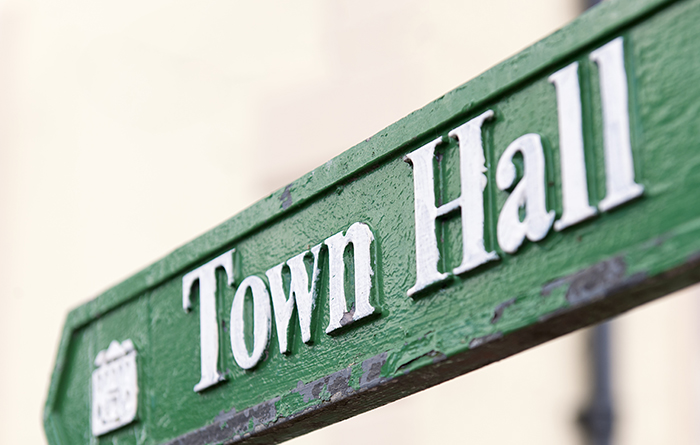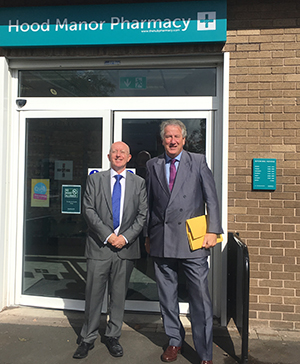In Practice
Bookmark
Record learning outcomes
Don't stop talking. The funding cuts in England give community pharmacy all the more reason to work on developing good relationships with local politicians and councillors.

Politics and community pharmacy have not exactly been skipping down the road hand in the hand of late. PSNC has rejected the Department of Health's imposed funding package for 2016/17, which will reduce funding for pharmacies in England from December 2016 to March 2017 by 12% on average compared to current levels, to £2.687 billion; and reduce funding for 2017-18 by 7.4% compared to current levels, to set funding at £2.592 billion for that year.
PSNC says negotiations over recent months "were not characterised by collaborative working" but presented by the Department as "a fait accompli", and Michael Dugher, a Labour MP who has led the campaign against the cuts in Parliament, agrees. He said: "Ministers promised they would listen and consult widely on their planned cost-cutting, but the government is set to force through [the] brutal package."
Although it may feel like no one is listening, the profession has had a lot of engagement with local MPs on this issue, as well as pressure on a national level' and this current state of affairs is certainly no reason to stop the conversation between pharmacy and politicians.
The benefits of talking
At times like these, it is more important than ever to keep talking and building relationships with your local political representatives, to ensure that the voice of pharmacy is heard and government policy reflects the priorities, concerns and aspirations of pharmacists.
"Engaging with politicians is a key way for contractors and their teams to demonstrate the value and potential of the community pharmacy network", says Zoe Smeaton, head of communications and public affairs at PSNC. "Politicians can act as advocates for the sector, promoting pharmacy to the public and influencing the policy decisions made by ministers and the NHS. Opposition MPs can also help to put political pressure on the government to press it to support community pharmacy, and local councillors can help shape local pharmacy policies and decisions."
Chris Ford, public affairs and communications manager at Pharmacy Voice, is very used to engaging with key stakeholders in Westminster and Whitehall, but he is also familiar with the other side of the coin. Last year he was elected as a councillor on Chiltern District Council, and he is also a parish councillor for Chalfont St Peter Parish Council.
He says there are benefits for both sides: "Contractors benefit because, as a key component of the community delivering services on which community depends, they can help councillors and MPs better understand the value of what they do, and this then equips MPs with the information they need to effectively represent pharmacy. Once they know the challenges pharmacies are facing, most MPs are more mindful to help."
As a longstanding leader and innovator in community pharmacy, Ash Soni has extensive experience in engaging with councillors and politicians at all levels and agrees that engagement is vital because "people only know what they know".
"Local councillors get to know the local population at a local level, and they are also probably a client of their local pharmacy so have an idea of what pharmacy can offer, but it's still worth telling them more about what you can do," Mr Soni explains. "And when it comes to local MPs, they have some influence with CCGs and local authorities around what they are doing to utilise pharmacies so they can be a key partner for you. There are some 600 MPs and they talk to each other, so if you can influence them and they talk to colleagues, you create an opportunity for building a force on behalf of pharmacy, as we have seen with the two million signatures on the funding cuts petition."
A foot in the door
If you don't already have a connection, what's the best way of making contact and then building a relationship with your local political representatives?
Ms Smeaton says it starts with picking the right person: "Contractors should look for their constituency MP or the pharmacy's local (ward) councillor. If you live in a different constituency to your pharmacy, start any correspondence with", my pharmacy provides NHS care to the residents of [name of constituency] and employs five [constituency] residents' to make sure the MP knows the issue is relevant to their constituents. Be sure to include your contact details, including an email address, in all communications with politicians.
"It is then a good idea to speak to the local LPC to see what contact they have had with the politician and ensure that your efforts will support their ongoing work and relationships." The LPC may be able to offer advice on key messages or other ways in which you help with local lobbying efforts, she advises.
But don't just wait for a problem to arise before you start making connections. Graham Phillips, director and superintendent pharmacist of Manor Pharmacy Group in Hertfordshire, says he's worked on building relationships with his local MPs and councillors over many years, "rather than simply waiting until a rainy day to make contact with them."
This first contact can start small. "Just invite them to your pharmacy," says Mr Soni. "Politicians are delighted to have their picture taken for the local paper showing their support for their local community."
Jane Devenish, the NHS standards & services pharmacist at Well Pharmacy, suggests combining the visit with a health check or flu vaccination "to give you the opportunity to demonstrate the important work that you do to support the local community. All MPs have a constituency office in the local area, which makes it fairly easy to invite them into the branch personally or to send an invitation for their attention. Many politicians are also active on social media, so engaging via social channels can also help to build up a relationship and keep in touch." The Royal Pharmaceutical Society is also happy to arrange pharmacy visits for MPs to engage them directly with the work pharmacists do day-to-day, and the Society's Public Affairs team can provide resources and guidance to members for arranging their own visits, available at rpharms.com/talking-to-government/get-involved.asp
Information toolkits
If you plan to start a conversation with your local politicians, think about what information and insights they need from you in order to help. It might be that they need background information on exactly what the Government's plans are for pharmacy, and you can couple that with examples of times when the care provided by your pharmacy team has made a real difference to patients.
If they want to get involved and help, it is likely they will need some key facts or statistics that they can use in letters, questions or debates. PSNC's infographic on the recent PwC report on the value of community pharmacy services provides a good starting point and can be downloaded from the resources section at: psnc.org.uk/valueofpharmacy. A range of other useful resources and briefing materials for MPs are also available to download from: psnc.org.uk/campaign.
Susanne Cameron-Nielsen, head of external relations at RPS Scotland, says the key to getting the most out of any interaction is to be mindful of how you can add value to the conversation: "Focus on the person as an individual and what their specific areas of interest are. The more you can tailor your contact, the more it can affect policy making, send them stuff you think they might be interested in whenever you see it."
Helpful outcomes
It takes thought and effort to nurture these kinds of relationships, but it can be time well spent. When the pharmacy cuts were first discussed, Mr Phillips emailed his local council town clerk at 9 pm on a Friday evening and received a response at 10 pm inviting him to come and talk at the next council meeting.
"I had five minutes to explain the work of community pharmacy and what the cuts would mean for us, and by the end of it they said they'd do whatever we needed them to do to help," he says. "Every single community pharmacist could do this, but they don't, or maybe they just don't realise how to."
Mr Soni also reports positive results from interactions with his local authority: "We haven't had any services decommissioned because we've got to know them over the years on a first name basis. They see the value of what these services are, so they trust what we are telling them." However, he adds a caveat:
"Remember to recognise the council and civil service staff, such as the directors of adult social services and public health, if you want to influence outcomes, as they are making the day-to-day decisions."
Mr Ford suggests that pharmacists should also consider the opportunity to influence change from within: "I know they are very busy people but I'm a passionate believer that more pharmacists should be getting involved in local government. Pharmacists are uniquely placed at the heart of the community, so what better person to be a councillor and demonstrate the breadth and depth of what pharmacy does."
Grassroots conversations
MPs, like community pharmacists, are busy people, but many pharmacists have been successful in organising successful visits that allow them the opportunity to talk about their work in detail.
David Mowat MP engages with pharmacy in Warrington
In September, Steve Jeffers, CEO of the Hub pharmacy, invited David Mowat, MP for Warrington South and minister with responsibility for pharmacy, to the group's Hood Manor Pharmacy (pictured right).
Following the visit, Mr Jeffers said: "I think it was helpful for the minister to see how one of his local community pharmacies operates and how pharmacy is now offering to play a wider role in patient care over the coming years via the proposals contained within the Community Pharmacy Forward View."
Jenny Rathbone MP visits Cardiff pharmacy
Someone who has needed little convincing about the value of community pharmacy is Welsh Assembly member (Labour) for the Cardiff Central constituency, and chair of the Cross Party Group on Diabetes, Jenny Rathbone.
Prior to the Welsh elections in May, RPS Wales arranged a visit for her to Clifton Pharmacy in Cardiff to meet owner and community pharmacist Sudhir Sehrawat, who is also one of the RPS Wales Board Members.
"I'm a passionate supporter of the NHS and have served on a health trust, and chaired independent NHS complaints panels, so I know how things ought to work," she says. "Engaging with community pharmacy is not new to me, as I've been involved in trying to improve primary care for at least 15 years, but I still think pharmacists are an underused resource. A big issue for me at the moment is the Individual Health Record (IHR) because we need a more joined-up facility for the sharing of notes, which I've discussed with the BMA, but this can and should be resolved at a local level."
Get talking...
For more information on contacting local politicians, speak to your LPC or read PSNC's campaigning guidance for LPCs.
PSNC's key campaign messages are still useful and may help you in drafting a letter to your MP, or you could look at the NPA's lobbying tool, available from lobby.supportyourlocalpharmacy.org
At times like these it is more important than ever to keep talking with your local politicians, to ensure the voice of pharmacy is heard

